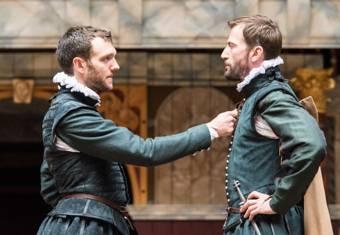Julius Caesar - Shakespeare's Globe 2014
What happens when a great man falls? And what happens to you, if you were the one to make him fall? Above all, what happens to your society, his society, after he has fallen? Shakespeare's study of political extremism, violence and civil war feels almost chillingly relevant today: as Rome slips from angry whispers and furtive plots into secret murder, armies on the streets and unresolved political terror, we can think of other countries where the removal of a much-feared figurehead has only started a new chain of problems, the original liberators now deeply embroiled in retaliations public and private. Yet, behind the world stage that is the Roman Empire, Shakespeare uses the intimacy of Roman elite society to produce a profoundly personal story of friendship, loyalty, pressure and betrayal among a small group of men, who know each other, love each other and kill each other.
Dominic Dromgoole's energetic, intense production for Shakespeare's Globe brings these male friendships into sharp relief, allowing us to feel each crisis developing, and giving each character and movement of the plot its due weight. As emotions and betrayals mount, Cassius and Brutus begin to fall apart, Cassius (Anthony Howell) unravelling in weak greed, Brutus (Tom McKay) imploding in a silent Stoic scream. George Irving gives us a subtle and unsettling Julius Caesar, whose suave social assurance is a velvet glove over an extremely steely fist, his impact on Rome and Romans undeniable and ineradicable. Shakespeare knew Julius' death ushered in the days of Nero and Caligula: Rome's Republic dies with this Caesar.
Dromgoole's production is vivid, focused and full, giving us much to enjoy and even more to ponder. Luke Thompson's clear, fresh delivery is a constant delight, particularly his sensitively modern phrasing of Shakespeare, allowing the most familiar of Mark Antony's fine speeches to strike us anew (and gaining a great, and appropriate, roar of laughter at his mendacious "I am no orator"). In Catherine Bailey's moving and inspirational Portia, I saw for the first time Shakespeare's subtle connection between Brutus and Portia, and Macbeth and his Lady; in her "I am a woman; but..." I caught the echo of Elizabeth I's battle cry to her troops at Tilbury. In Brutus' repeated urgings to the sleepers around him to wake, I noticed a veiled reference to Christ's Passion which I had never seen before. The parallel scenes (Calpurnia kneeling to Caesar, Portia kneeling to Brutus; Mark Antony bent in grief over Caesar's, Titinius over Cassius's corpse) strike us with savage irony.
Jonathan Fensom's design actively recalls Elizabethan staging, with period sound effects (complete with shawms, sackbut and theorbo) by Tom Lees. So, we have a storm of shimmering cymbals; drums for fights and moments of high terror; and a trio of female voices who burst into chant-like song at the principal deaths. For me, these chants were a little strident, though their intention is valuable; Lucius' lullaby, meanwhile, is a treat. We finish, as the Chamberlain's Men would have done, with an ecstatic dance (choreographed by Siân Williams) in which the actors release the joy of their performance with almost pagan delight, the dead dancing with the living, murderers turning hands with their victims, leaving the audience on a glorious high. No Roman Emperor could ask for better.
Originally published on
